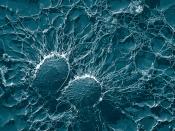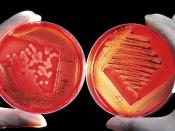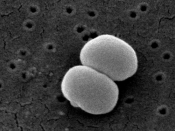In laboratory we are doing a study on Staphylococcal carriers and whether or not the carry Staphylococcus aureus. Staphylococcus aureus is a bacteria that is a normal element of the skin and inside the nose. Some people can carry Staphylococcus and not be infected by it. The two major species of Staphylococcus are Staphylococcus aureus and Staphylococcus epidermis, the difference is distinguished between the fermentation of mannitol salt agar. Staphylococcus aureus will ferment mannitol and produces acid and Staphylococcus epidermidis does not. Sometimes, Staphylococcus may cause infection the most common being skin infections. Most of these infections are minor and can be treated without antibiotics. Such minor infections of Staphylococcus are skin infections, bone infections, and pneumonia. Occasionally, Staphylococcus bacteria can also cause serious infections such as severe life-threatening bloodstream infections. These diseases are spread by having direct contact with the infected individual. Although some skin infections may be infected by indirect contact by touching inanimate objects.
It is important on how Staphylococcus is spread because a person is liable to pick the infection up from almost anywhere. According to the Center of Disease Control, most serious staphylococcus infections were treated with a certain type of antibiotic related to penicillin. Although, over the years, the treatment methods for these infections have become difficult because of antibiotic resistance.
As reported, by the Center of Disease Control, "antibiotic resistance can cause significant danger and suffering for children and adults who have common infections," that may have once been able to be treated easily with antibiotics. The use of antibiotics encourages the development of antibiotic-resistant bacteria. Bacteria that become resistant to antibiotics occurs when bacteria mutate causing a reduced or even maybe eliminating the effectiveness of drugs, or any other chemical designed to prevent disease. These bacteria learn to survive and therefore,


